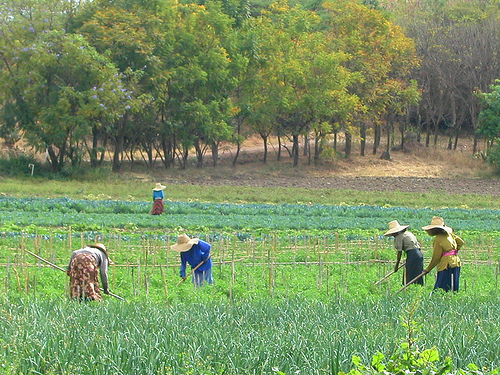This is a guest post by Puspa Sharma, MA Candidate in Global Finance, Trade and Economic Integration at the Josef Korbel School of International Studies, University of Denver.
 Exponential increases in food prices in recent times have created enormous challenges to governments, national and international organizations, and aid agencies everywhere in the world. The World Bank has estimated that the rising food prices could push an additional 100 million people into poverty, thereby undermining the current efforts geared towards poverty reduction.
Exponential increases in food prices in recent times have created enormous challenges to governments, national and international organizations, and aid agencies everywhere in the world. The World Bank has estimated that the rising food prices could push an additional 100 million people into poverty, thereby undermining the current efforts geared towards poverty reduction.
Increasing demand, decreasing supply, and the rising oil prices, which are in turn affected by numerous other factors, have been some reasons for the rise in food prices. Demand for cereal grains has been rising not only as a result of population growth, but also because of the growing middle class population in countries like China and India. Growing incomes have resulted in more demand for cereal grains directly and also more meat and dairy, which in turn has raised the demand for more grains as feed for the livestock. Another more important reason for the rise in demand for food crops is the development of bio-fuels, which have attracted a great deal of attention in recent times.
On the supply front, according to a publication by the International Center for Trade and Sustainable Development (ICTSD), droughts in Australia and Turkey and bad weather in Ukraine and parts of North America have resulted in less agricultural production which has caused food prices to rise. A more important, but often overlooked reason for the decrease in the supply of farm commodities against rising demand is that the subsidies that the developed countries have been providing to their agriculture sector have dampened world prices of those products and made the products of developing countries uncompetitive. This has had a tremendous impact in agricultural production in developing countries. In the absence of competitiveness and any other gains to be derived from agriculture, the developing countries have had less incentive to invest in agricultural infrastructure, agricultural research and development, and the like. As a result, agriculture production in these countries continually declined disrupting supply.
Then, who should take the blame of rising food prices? If we look at the demand side, we see that the demand has been rising in one part because of rising incomes in few developing countries, and on the other, because of the development of bio-fuels by the developed countries. On the supply side, drought and bad weather conditions are not something which are under human control, but less supply resulting from less production in developing countries owing to the agricultural policies of the developed countries definitely deserves attention.
Discussing about the demand side, demand for more cereal grains as a result of the changing food pattern in developing countries have arisen because of the climbing up of the prosperity ladder by people of these countries. The rise of the middle class is not an unwanted development and the changing food pattern owing to such development is something that is not under the control of any government to regulate. But what about the demand for more food grains for bio-fuels? As noted by Sophia Murphy, more demand for bio-fuels, especially from the biggest energy consumers like the EU and the US has resulted in more agricultural crops being converted to liquid fuels on a commercial scale. That is not to underestimate the beneficiary effects of bio-fuels to the environment, and the sustainability of energy sources. But the concern is, can the overall demand for energy be reduced and is there an alternative way of producing bio-fuels?
On the supply front too, decrease in production and hence supply because of adverse weather conditions is unavoidable. But could not less production in developing countries that were dampened by the agricultural policies of the developed countries have been avoided?
Discussions on the effects of subsidies show that the effects have been two-fold. On the one hand, subsidies are said to have dampened world prices of agricultural products, but on the other, in the long run, subsidies seem to have been one of the reasons for the rise in prices of those products. The challenge at this point then is to distinguish between which effect of subsidies has been more severe and what effect that is going to have in the future.
Low prices of agricultural products as a result of subsidies provided by developed countries have remained a major issue of contention since it has led to the displacement of farmers from the agriculture sector in developing countries, thereby exacerbating poverty. That is the major reason why the Doha Round of trade talks in the WTO is not concluded even after about seven years. Then, can subsidies be justified in the present context when they have been contributing to raise the prices of farm commodities? The answer depends on who really is benefiting from the rising prices.
The farmers who have already been displaced are surely not benefiting. Even those farmers, especially in developing countries, who are still engaged in agriculture, are generally unaware of market trends and therefore it is the intermediaries who get to gain from such increases in world prices. Moreover, even if farmers are aware of the changing trends, they do not only receive extra gains out of price increases, but they also have to face the price increases in agricultural inputs like seeds and fertilizers. Also, a farmer receives higher prices for one commodity that he produces, but has to pay a lot more for other commodities to complete his consumption basket. Therefore, although it is difficult to generalize across all developing countries, farmers in most developing countries are not gaining much from the recent increases farm commodity prices.
Therefore, subsidies that have displaced farmers from agriculture and have contributed to raise the prices of commodities to go into the pockets of either intermediaries or a few wealthy farmers is certainly not justifiable. Hence, the developing countries’ demand that the developed countries eliminate subsidies provided to their agriculture is still a valid demand. But eliminating subsidies now can add more to the rise in food prices, which is going to impact the net food importing countries severely.
High price of farm commodities is certainly going to entice farmers who have been displaced from farming in developing countries to get back to their occupation. Consequently, supplies are going to rise to match demand, which will pull prices down eventually. But such adjustment will take some time. Therefore, the demand to eliminate subsidies might be appropriate only when developing countries start producing more again to balance demand with supply. Eliminating subsidies after that can have a long term impact in making developing country agriculture competitive and hence stabilizing the prices of farm commodities.







